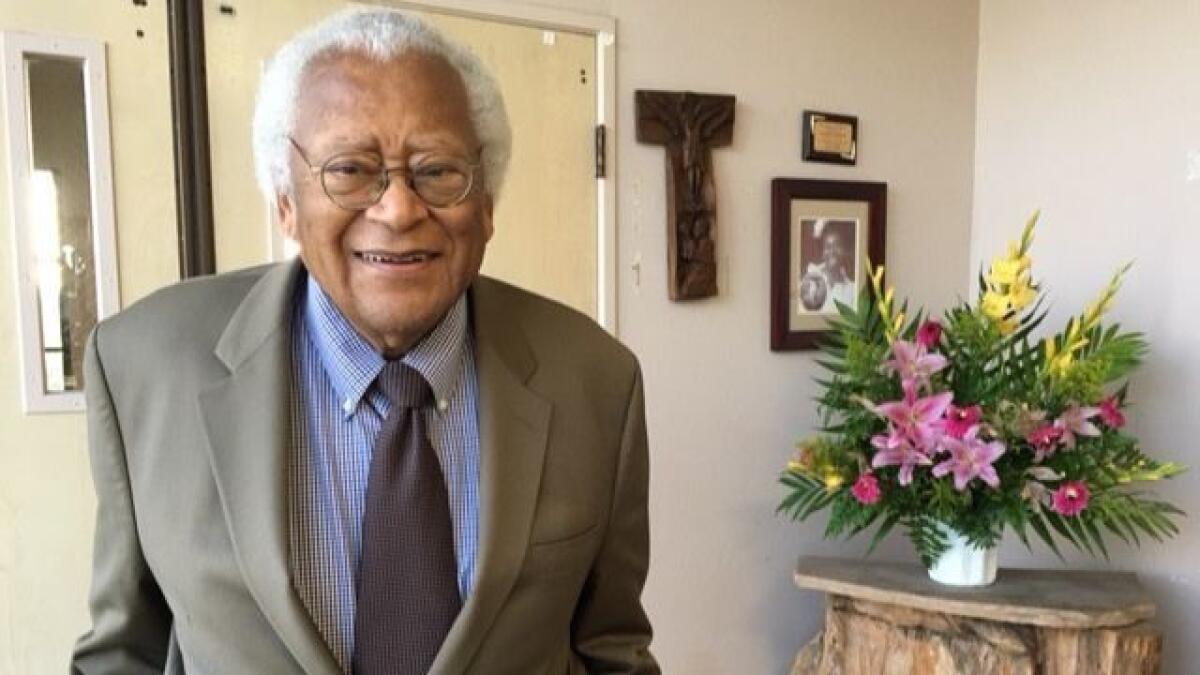Opinion: Sixty years after partnering with MLK, James Lawson still sees racism everywhere. Yet his optimism remains

- Share via
James Lawson and the Rev. Martin Luther King Jr. met across a dinner table at Oberlin College in Ohio in 1957. Lawson, a theology graduate student, and King, a rising figure in the civil rights movement though still in his 20s, recognized quickly that they were kindred disciples of nonviolence. Lawson planned to join the civil rights movement when he finished graduate school. In a single evening, King upended his timeline.
“King said, ‘Come now. Don’t wait,’ ” says Lawson, sitting in the front pew of a small chapel at the Holman United Methodist Church in Los Angeles. So he went south to teach nonviolence workshops and work with King. A decade later, in 1968, as a minister in Memphis, Tenn., involved in the campaign to win better wages and conditions for striking sanitation workers, he invited King to come to Memphis to speak and help build community support for the workers. Lawson was sitting in the Mason Temple on April 3 when King delivered his prophetic “Mountaintop” speech (in which he mentioned Lawson by name and thanked him for his leadership and perseverance). The next day, King was shot dead on the balcony of the Lorraine Motel.
You won’t hear Lawson sink into a brooding rant on how things have not changed enough.
They were the same age, King and Lawson. Fifty years after King’s death, Lawson is a member of a rapidly diminishing group of King’s contemporaries who can tell you what it was like then and how it compares to now. Lawson has had the opportunity to live the long life that King was denied. For 25 years he was the pastor of the Holman United Methodist Church in the Jefferson Park neighborhood. At 89, sharp-minded and contemplative (see his TEDx talk from three years ago), he continues to be a presence here at the church and he still teaches at Cal State Northridge. He is scheduled to be in Memphis on April 4 for the events commemorating King’s assassination 50 years ago.
You won’t hear Lawson sink into a brooding rant on how things have not changed enough. History, he has said, moves at its own pace. He’s optimistic that the American people “have seen over the last 25 to 30 years the interconnectedness of so many issues — racism, sexism, violence, the rights of the handicapped, the rights of the Indian people.”
Yet he is clear that society continues to be tarnished and damaged by racism. He sees it everywhere — from continuing police violence against unarmed black men to the disproportionately black population of Los Angeles County’s jails. Not to mention the 40% of the homeless population of L.A. County that is black (even though blacks make up only 9% of the county population).
Lawson is still a believer in controlled, disciplined, nonviolent protest, and he has plenty of thoughts about today’s activists and their movements.
On the Black Lives Matter movement, he says: “They haven’t dealt with the issue of how we get the white power brokers to change their minds.” As for how you do get change made, he suggests: “If the police department were told by the Chamber of Commerce that this killing of unarmed people must stop, it would probably stop within six months… If the Chamber of Commerce told the police union that and the city government that, I venture to suggest that it would stop within six months.”
Lawson worries that framing the movement for racial justice as a “civil rights” movement allows people to categorize it as something that concerns one group and no one else. Better, he says, to think of all our progressive movements — for gun control, for better pay for teachers, against police violence, against sexual harassment — as parts of a broader human rights movement that should concern us all.
Talking about King with this long-serving minister who knew him 60 years ago, I was reminded again of the historic role of the church in the struggle for rights, dignity and justice for black people. It wasn’t just King, but also Ralph Abernathy, Andrew Young, Fred Shuttlesworth and numerous other ministers, rabbis and priests who found their way to the civil rights movement. Los Angeles today could use more clergy stepping up, exhorting their congregations, offering their churches or temple parking lots as overnight safe havens for homeless people in vehicles, offering for lease or sale some of their property or apartment buildings for housing for homeless people.
Ask Lawson if there is anyone today who embodies the leadership qualities of King and he can think of only a few: William Barber, the North Carolina Protestant minister and co-chair of the Poor People’s Campaign. Desmond Tutu, the South African cleric and human rights activist. But he doesn’t fret that he can’t name more. “There are probably people working that I don’t even know about,” he says. That may be the most optimistic thing he has said this afternoon.
Follow Carla Hall on Twitter @latCarlaHall
More to Read
A cure for the common opinion
Get thought-provoking perspectives with our weekly newsletter.
You may occasionally receive promotional content from the Los Angeles Times.










